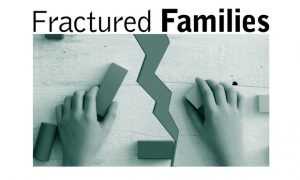'Deliberate, Scripted Torture': Parents Suing Phila. Public Defenders Describe 2-Year Separation From Daughter in Custody Case
"Our children's lives have been affected in ways we can't even quantify."
March 04, 2020 at 06:25 PM
10 minute read

Editor's note: The names of children and family members who are the subjects of this article have been changed to protect their privacy.
"Was I in your stomach?"
That's the question 4-year-old Emily asked her mother after having spent two years separated from her parents in the care of a convicted felon, as ordered by the Philadelphia Family Court.
Janet and Ray Martinez, now reunited with Emily, said in an interview with The Legal that their daughter notices things like being absent from family photos. She has lots of questions about where she was and who she was with that her parents don't know how to answer.
"When we talk about things, we try to dodge things. We don't know how to explain it to her yet," Ray said.
Janet added, "She knows something is off."
The Martinezes were accused of child abuse by a social worker, but were never allowed to present evidence to the contrary in court. From there, a chain reaction was set into motion that would propel the family into a two-year fight to regain custody of their daughter.
 It began when Janet brought then 7-week-old Emily to the Children's Hospital of Philadelphia in April 2016. The parents had noticed Emily appeared uncomfortable—the first two trips to the doctor each resulted in a diagnosis of an ear infection.
It began when Janet brought then 7-week-old Emily to the Children's Hospital of Philadelphia in April 2016. The parents had noticed Emily appeared uncomfortable—the first two trips to the doctor each resulted in a diagnosis of an ear infection.
Noticing Emily was still uncomfortable, the parents again went for a visit to the doctor, at which point an X-ray revealed Emily had sustained rib fractures. They said that they could only guess as to what had caused the injury, and thought it might be from Emily's older brother, a toddler, bumping into her. They maintain their innocence of child abuse allegations.
The matter was referred to the Department of Human Services, and eventually, Janet and Ray ended up in Family Court before Judge Lyris Younge, who ordered their child into foster care and blocked them from presenting any evidence that might exonerate them.
Eventually, Younge terminated their parental rights. Last month, Younge admitted to ethics charges that she violated the due process rights of those who appeared before her. Those charges came after Younge was removed from Family Court and reassigned to the Philadelphia court system's Civil Division following a series of articles in The Legal exposing the judge's history of violating parents' and other guardians' rights.
While Younge sent Emily to foster care, she ultimately deemed the Martinezes' home safe for her older brother, who had been living with Ray's mother, and allowed him to remain with his parents.
The judge continued to hold Emily in foster care to pressure the Martinezes into confessing to child abuse. The couple ultimately appealed. Two years after the initial separation from their daughter, the Superior Court overturned Younge's decision, slamming the lower court judge for doing "everything in her power" to break up the family.
"Despite record evidence that the trial court allegedly relied upon, the one factor, the elephant in the room, is that the trial judge was and remains the cause of the deteriorated bond," between parents and child, Superior Court Judge Anne Lazarus wrote in her May 4, 2018, opinion.
But, in a lawsuit filed Wednesday evening in the Philadelphia Court of Common Pleas, the parents claim that the events that transpired in Younge's courtroom would never have happened if not for the public defender who represented their children: defendant Patrice Langenbach of the Defender Association of Philadelphia.
They allege in their complaint that the "deteriorated bond" Lazarus referred to was the result of collusion between Langenbach and assistant city solicitor Alicia Bennette Harrison, representing the Department of Human Services. Neither Harrison nor Younge are listed as defendants in the lawsuit, as both are shielded by governmental immunity from suit.
Separation of children from parents for over a year is one cause for parental rights to be terminated under state law. However, it was Langenbach who sought the removal of Emily from the Martinezes' home to begin with, according to the complaint. She then used that separation to justify the termination of the Martinezes' rights, the complaint alleges.
While the case went on, Emily lived with Tenisha Williams, who in 2009 pleaded guilty to charges of tampering with records and interfering with the custody of children in Lower Merion Township.
Those charges stemmed from a custody battle with her estranged husband, Everett Terry. Williams concealed the whereabouts of their children and forged Terry's signature on court papers that would essentially strip him of parental rights and award Williams primary custody, according to a Montgomery County Detective Bureau affidavit. (The Martinezes have not formally alleged any mistreatment of their daughter by Williams and she is not a party to the lawsuit.)
Williams could not be reached for comment on phone numbers listed for her.
The Martinezes allege in their complaint that Langenbach and Harrison argued against placing Emily with family during the pendency of the case in order to intentionally inflict emotional distress.
"It was torture," Janet said. "Deliberate, scripted torture."
She said that the outcome of their case seemed decided from the beginning. "You walk into a room where everyone already knows what's going to happen."
They also had to cope with the day-to-day hardships of a separated family.
Ray said that they weren't allowed to see much of their son while he lived with his grandmother. "You tell your kid you're going to work for four months," he said.
Their son is afraid to sleep alone and is always concerned about where they're going, the couple said.
"Our children's lives have been affected in ways we can't even quantify," Janet said.
Additionally, the Martinezes said they have been put on the state's child abuse registry, from which there is no way to be removed. They have suffered economic loss as a result, losing their jobs as a nurse practitioner and graphic designer.
"We've lost savings, retirement funds, kids' tuition. We're struggling," Ray said.
William Leonard of Obermayer Rebmann Maxwell & Hippel, who represents the defendants, on Thursday called the Martinezes' complaint "legally insufficient."
"The Defender Association has achieved a well-earned reputation for strong and capable advocacy on behalf of those youths in Family Court. The Defender's service benefits the courts and the city," Leonard said in an email. "The complaint filed against it yesterday contains numerous inaccuracies and omits relevant facts. It brings claims that are legally insufficient and are largely grounded in the conduct of other parties. The narrative of collusion and conspiracy it seeks to weave is an outright fabrication. The Defender looks forward to clearing its good name against these allegations so that it may continue its mission of serving the citizens of Philadelphia and their courts."
Harrison, the assistant city solicitor, did not respond to requests for comment.
Taking Legal Action
"Nothing will return the two-plus years during which [Emily] and [her brother] and their family were tortured on a daily basis by the defendants, the City Solicitor's Office and all who actively participated or stood by and allowed this disgraceful miscarriage of justice to continue," the complaint says.
Despite complying with all court orders, such as attending parenting classes and therapy, while the case went on, the Martinezes allege Langenbach bad-mouthed them to parents and staff at court-ordered parenting school.
"'It doesn't matter what they do, they won't be getting [Emily] back,'" the complaint alleges Langenbach said. The couple also claimed in the complaint that Langenbach cut off Emily's supply of breast milk, allegedly saying, "'She's fine with formula.'"
Eventually, the complaint alleges, Langenbach conspired with Harrison to petition for the termination of the Martinezes' parental rights based on prolonged separation, which was approved by Younge, despite testimony that the family's home was safe for Emily to return to.
But then, the Superior Court ruled on the Martinezes' appeal.
"We find that the record herein provides example after example of overreaching, failing to be fair and impartial, evidence of a fixed presumptive idea of what took place, and a failure to provide due process to the two parents involved," Lazarus said in the Superior Court's opinion. "Finally, the most egregious failure in this matter is the refusal to allow kinship care, despite the paternal grandmother being an available and approved source for same. The punishment effectuated by the trial judge was, at best, neglectful and, at worst, designed to affect the bond between parents and [Emily] so that termination would be the natural outcome of the proceedings."
The Superior Court ordered Younge to recuse herself from the remainder of the case, which was then reassigned to Family Court Judge Allan Tereshko. The complaint alleges that while appearing before Tereshko, Langenbach, as the child's advocate, lied about her opposition to placing Emily in kinship care.
Eventually, Tereshko removed Langenbach from the case.
"This court finds that the child advocate failed to act in the best interests of the child by standing silently and failing to object or challenge the trial court [Younge] while it denied her child the right to be placed with her grandmother, in violation of CPSL (Child Protective Services Law)," Tereshko said in a transcript laid out in the complaint, "and while the trial court advanced her plan to judicially coerce a confession from the parents as to the cause of the child's injury. This mute acquiescence requires a new child advocate be appointed for the child."
Although the family is reunited, the Martinezes' lawyers, Jay Edelstein and A.J. Thomson of Edelstein Law in Philadelphia, said the scars of the ordeal will always be there.
Both Thomson and Edelstein said the child welfare system in Philadelphia is in need of reform.
"We have a city where 5,000 kids are removed from their families each year. I would imagine a sizable amount of kids should not be removed," Thomson said. "That's an abject failure on the city's part."
Edelstein advocated for public access to the family court system, which he said would invite accountability of judges and lawyers. He pointed to Pittsburgh's family courts as a model.
"The easiest change would be to go the way Allegheny County went and open up the doors so the light is shining in and it's public. You can't hide behind the closed doors," Edelstein said.
Ultimately, the Martinezes said their experience has led them to be skeptical about the court system.
"Even if you're doing the right thing, you can't trust the system," Ray said. "We've also seen people in the system who are completely helpless and got railroaded by the system. If we didn't have family and attorneys, we would be nowhere. We've seen a lot of people who were silenced."
But the Martinezes said that their case should serve as an example to other parents in similar situations to keep fighting for their children and to not be afraid to take their children to the doctor if they think they're sick or injured.
Additionally, Ray said that he and his wife hope the suit prompts change in Philadelphia's Family Court.
"I hope that other people who are railroaded—guilty or not—get a fair shot."
This content has been archived. It is available through our partners, LexisNexis® and Bloomberg Law.
To view this content, please continue to their sites.
Not a Lexis Subscriber?
Subscribe Now
Not a Bloomberg Law Subscriber?
Subscribe Now
NOT FOR REPRINT
© 2025 ALM Global, LLC, All Rights Reserved. Request academic re-use from www.copyright.com. All other uses, submit a request to [email protected]. For more information visit Asset & Logo Licensing.
You Might Like
View All


Stevens & Lee Hires Ex-Middle District of Pennsylvania U.S. Attorney as White-Collar Co-Chair
3 minute read
Judge Tanks Prevailing Pittsburgh Attorneys' $2.45M Fee Request to $250K
5 minute readLaw Firms Mentioned
Trending Stories
- 1Two More Victims Alleged in New Sean Combs Sex Trafficking Indictment
- 2Jackson Lewis Leaders Discuss Firms Innovator Efforts, From Prompt-a-Thons to Gen AI Pilots
- 3Trump's DOJ Files Lawsuit Seeking to Block $14B Tech Merger
- 4'No Retributive Actions,' Kash Patel Pledges if Confirmed to FBI
- 5Justice Department Sues to Block $14 Billion Juniper Buyout by Hewlett Packard Enterprise
Who Got The Work
J. Brugh Lower of Gibbons has entered an appearance for industrial equipment supplier Devco Corporation in a pending trademark infringement lawsuit. The suit, accusing the defendant of selling knock-off Graco products, was filed Dec. 18 in New Jersey District Court by Rivkin Radler on behalf of Graco Inc. and Graco Minnesota. The case, assigned to U.S. District Judge Zahid N. Quraishi, is 3:24-cv-11294, Graco Inc. et al v. Devco Corporation.
Who Got The Work
Rebecca Maller-Stein and Kent A. Yalowitz of Arnold & Porter Kaye Scholer have entered their appearances for Hanaco Venture Capital and its executives, Lior Prosor and David Frankel, in a pending securities lawsuit. The action, filed on Dec. 24 in New York Southern District Court by Zell, Aron & Co. on behalf of Goldeneye Advisors, accuses the defendants of negligently and fraudulently managing the plaintiff's $1 million investment. The case, assigned to U.S. District Judge Vernon S. Broderick, is 1:24-cv-09918, Goldeneye Advisors, LLC v. Hanaco Venture Capital, Ltd. et al.
Who Got The Work
Attorneys from A&O Shearman has stepped in as defense counsel for Toronto-Dominion Bank and other defendants in a pending securities class action. The suit, filed Dec. 11 in New York Southern District Court by Bleichmar Fonti & Auld, accuses the defendants of concealing the bank's 'pervasive' deficiencies in regards to its compliance with the Bank Secrecy Act and the quality of its anti-money laundering controls. The case, assigned to U.S. District Judge Arun Subramanian, is 1:24-cv-09445, Gonzalez v. The Toronto-Dominion Bank et al.
Who Got The Work
Crown Castle International, a Pennsylvania company providing shared communications infrastructure, has turned to Luke D. Wolf of Gordon Rees Scully Mansukhani to fend off a pending breach-of-contract lawsuit. The court action, filed Nov. 25 in Michigan Eastern District Court by Hooper Hathaway PC on behalf of The Town Residences LLC, accuses Crown Castle of failing to transfer approximately $30,000 in utility payments from T-Mobile in breach of a roof-top lease and assignment agreement. The case, assigned to U.S. District Judge Susan K. Declercq, is 2:24-cv-13131, The Town Residences LLC v. T-Mobile US, Inc. et al.
Who Got The Work
Wilfred P. Coronato and Daniel M. Schwartz of McCarter & English have stepped in as defense counsel to Electrolux Home Products Inc. in a pending product liability lawsuit. The court action, filed Nov. 26 in New York Eastern District Court by Poulos Lopiccolo PC and Nagel Rice LLP on behalf of David Stern, alleges that the defendant's refrigerators’ drawers and shelving repeatedly break and fall apart within months after purchase. The case, assigned to U.S. District Judge Joan M. Azrack, is 2:24-cv-08204, Stern v. Electrolux Home Products, Inc.
Featured Firms
Law Offices of Gary Martin Hays & Associates, P.C.
(470) 294-1674
Law Offices of Mark E. Salomone
(857) 444-6468
Smith & Hassler
(713) 739-1250





